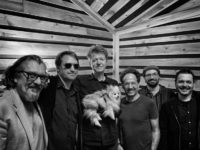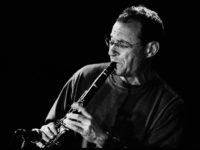The Nels Cline Singers’ identity has always been elusive thing to pin down, which is kind of the point of the band. “I was a rock and roll kid, but after hearing Coltrane and Miles and Weather Report, then Indian music and Nigerian pop and that sort of thing, there was no turning back,” says guitarist, leader and namesake Nels Cline. “From that point on, the idea of purism just was not possible.”
So with the Singers’ fifth album on its way, one thing for certain about that album is that there are going to be things on it not found on the first four. Macroscope, as its called, is another charismatic chameleon of a record, defying anyone to stick it in a category, or even three of ’em. And just as you think you can do that to even a single song, the song will change styles on you, sometimes multiple times. Whenever a track starts out relatively pedestrian, you come to know that it never stays that way; weirdness is always lurking around the corner. “Companion Piece” has soft almost innocuous beginning, then it gets frenzied. “Red Before Orange,” with electric piano supplied by Cline’s wife Yuka C. Honda, even veers dangerously close to smooth jazz territory as Cline grooves along like Doc Powell and then elects to go Jimi Hendrix for his solo.
These are the least of the surprises found on Macroscope, however. The lineup finally experienced a change when Devin Hoff decamped and was replaced by the equally qualified Trevor Dunn; Scott Amendola remains on drums. Dunn’s thick and supple bass can be heard holding down the harmony on Amendola’s briskly paced groove of “Canales’ Cabeza” while Cline is free to jam. Dunn’s acoustic bass gets a good workout on “Seven Zed Heaven,” which has a knotted front-end motif similar to Eddie Harris’ “Freedom Jazz Dance.” This angular trio piece held in place by Dunn’s tactfully placed acoustic bass notes, and Cline spins off effects while soloing, countered by Dunn’s own bouncy solo passage. That in itself would wrap up a nice performance, but then Cline and his crew go on to conjure up rich, melodious textures with an overlay of buzzy string sounds, which extends the length of the song by another six minutes.
The most intriguing turn comes from the mouth of Cline himself: he sings! These aren’t lyrics (which he’s probably saving to spring that on us for another album) but rather wordless vocals inspired by Brazilian legend Baden Powell. Tribal percussion with soft warm textures from guitar washes over your ears on “Respira,” with Cline singing along the chords in a way that enhances the melody. He can also be heard singing along to simple acoustic guitar figures on the semi-titular “Macroscopic.”
“The Wedding Band” is the kind of wide-ranging song no other band could pull off. It begins with some typical NCS weirdness when Cline splays guitar electro effects over percussion and later some East Indian sounds make their way into the mix, effortlessly easing into country-folk. There, it settles into a Midwestern Americana groove for a while until Cline gets screechy to take the song out.
Other left-field delights include a wicked, fuzz bass stomp within “Hairy Mother,” featuring Nels in metal mode, and the craggy straight jazz that spews forth in spurts and stops during “Sascha’s Book of Frogs.”
If there was any stylistic stone remained uncovered by Macroscope, it probably deserved to be left alone. The Nels Cline Singers can do everything, all right, but their true distinction is that they do it with verve and always manage to craft something artful in the process.
The Nels Cline Singers’ debut for Mack Avenue Records, Macroscope will drop on April 29, 2014.
- Christian Marien Quartett – ‘How Long Is Now’ (2024) - April 18, 2024
- Dave Douglas, feat. James Brandon Lewis – ‘Gifts’ (2024) - April 11, 2024
- Thollem – ‘Worlds In A Life, Two’ (2024) - April 8, 2024




